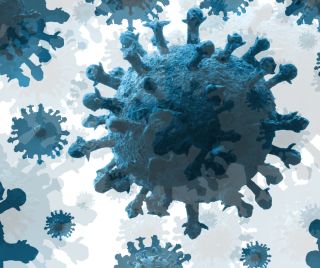Long Covid
Covid-19 Found in People’s Blood Months After Infection
Lancet study finds Covid-19 viral proteins in blood of 25% of people post-Covid
Updated April 26, 2024 Reviewed by Tyler Woods
Key points
- A quarter of people had Covid-19 viral proteins in their blood up to 14 months after infection.
- These proteins in the blood indicate that SARS-CoV-2 keeps living in tissue reservoirs.
- The study used a research-grade test that is not available outside of research labs.
- The strongest evidence to date that Covid-19 persists in the body provides an important clue to Long Covid.
Researchers have detected Covid-19 viral proteins in the blood of 25 percent of patients, even up to 14 months after the initial infection with SARS-CoV-2. This means that for some Long Covid patients, their symptoms could come from ongoing infection.
With the strongest evidence to date that pieces of the Covid-19 virus can go on living and actively replicating inside patients long after the initial infection, a new research study provides an important clue to Long Covid. In the paper, published in Lancet Infectious Diseases, a UC San Francisco/Harvard Medical School team found viral proteins from Covid in the blood of a quarter of patients over a year after their first infection. The team used a new ultra-sensitive blood test to detect SARS-CoV-2 viral proteins in the blood of 171 people who had been infected with Covid.
Viruses can have long-term health effects
According to Michael Peluso, M.D., one of the study authors and an infectious disease researcher at UCSF, the study started when his team that had been focused on HIV pivoted their infrastructure to studying Covid-19. When the pandemic began, the team noted that the public health messages were operating from a common medical framework. When we heard “that this was going to be a two-week illness for everyone and everyone was going to then fully recover and get on with their lives [we knew] that this was almost certainly not going to be true,” says Peluso, “because of what we know about long-term consequences of other infections.”

As early as April 2020, the team began collecting clinical data and blood samples on volunteers after they'd had Covid. They then annotated and stored the samples in order to be prepared to answer whatever questions emerged about the SARS-CoV-2 virus over the next year.
But it was only in the fall of 2020, as the world began to reopen, that the team began to wonder if the Covid virus could persist in the body long-term. “As the healthcare system reopened, a lot of medical procedures required a Covid test. We began seeing a huge number of people who had what were thought to be either false positive Covid tests or reinfections. But when we tried to work them up, none of them were reinfections. Nobody really knew what was going on,” says Peluso.
Ultra-sensitive test for Covid-19 viral proteins
Meanwhile, since 2020 a few studies had published findings suggesting that Covid-19 can persist in the body long after the expected two weeks. Those studies were also very small, and typically looked at a highly selected group of people. In response, the UCSF researchers designed the current study to find out if they could detect evidence of SARS-CoV-2 viral persistence among all comers in their cohort.
One of those small studies was done by David Walt at Harvard. “We had an existing relationship with him and his lab from working together on HIV,” says Peluso. “So we partnered up and basically applied his assay to our samples.” Walt, a highly regarded technology developer, had designed an ultra-sensitive research assay (only available to researchers) called the Simoa (Quanterix) single-molecule array detection platform to measure SARS-CoV-2 spike, S1, and nucleocapsid antigens. The test can find very small amounts of proteins in a sample with almost 1,000 times more sensitivity than the regular tests used by other research groups.
According to Peluso, this single-molecule array is a type of immune assay. Because such immune-based assays are less specific than the commonly used PCR, some skeptics concluded that the prior studies were detecting false positive signals.
Pre-pandemic blood samples proved the test worked
In order to prove that their findings were not a false positive signal, the team ran the same test on 250 samples collected from a mix of people in 2012-2019. The team was able to show that people who had had Covid showed specific proteins in the blood that the pre-pandemic samples did not have.
Less than 2 percent of the pre-pandemic blood samples came up positive, as compared to 25 percent of the blood samples from 171 people who'd had Covid. The team also accounted for vaccination and possible reinfections in their post-pandemic samples, and still found evidence of persistent viral proteins. This means the false positive signal was very low.
A surprisingly high number of people still had Covid in their blood
When they found that 25 percent of people still had Covid-19 viral proteins in their blood up to 14 months after initial infection, “we were actually quite surprised,” says Peluso. They had not expected to find this in so many, because their population was truly undifferentiated and did not distinguish between those who had fully recovered and those who had Long Covid.
“The thing that I find so compelling about the data in this study is that there is a pretty striking relationship between how sick people were during their acute Covid infection and how likely they were to have evidence of antigen persistence,” says Peluso. “To a clinician like me, that is very convincing, because intuitively, it makes sense that people who perhaps have a higher burden of virus upfront would be more likely to have a virus that sticks around.”
Convincing evidence of Covid-19 viral persistence
For Amy Proal, Ph.D., president and research director of PolyBio, which supported the study, “This is very convincing evidence that at least a certain percentage of people are still harboring persistent virus after Covid.” Proal continues, “There is no mechanism by which protein would be present in these samples, especially in the blood where the body would normally degrade it.” Proal explains that it is biologically illogical to think the protein could just persist on its own. Rather, it’s much more likely that it's produced by a virus hiding in tissues and still translating sometimes. (Translating is what happens when a virus takes over our cell’s apparatus and uses it to make copies of itself).
According to a recent paper in Nature Immunology, which Proal authored along with over thirty other researchers from around the world, the SARS-CoV-2 virus can persist in tissues as a reservoir and keep replicating. In another study, the same UCSF team behind the Lancet study also found SARS-CoV-2 RNA in gut tissue up to 600 days after infection. A French team presented a research poster showing Covid spike protein in the blood of long Covid patients, as well as SARS-CoV-2 double-stranded RNA indicative of viral replication in the platelets of Long Covid patients. In children, SARS-CoV-2 RNA has been found in the lymph node tissue hundreds of days after infection.
“We do think that is what's happening with patients,” says Proal. “We know that SARS-CoV-2 is a tissue-associated virus that infects almost every single tissue type of the human body, including the gut, lungs, and brain. We've known from the beginning that the virus itself could be hidden anywhere in tissue and then we wouldn’t find its genetic material with typical blood tests.” Only with a test as sensitive as the one used in the Lancet study could researchers even find the tiny amount of viral proteins that leak into the blood.
In a recent Twitter/X thread on the Lancet study, Proal points out that even the finding that 25 percent of people are harboring Covid virus may be an underestimate. First, proteins from deep reservoirs like the brain or nerves might not make it into the blood. Second, the Covid viral proteins that do leak into the blood may become trapped by immune cells or microclots (sticky collections of amyloid, fibrin, and platelets that stick to blood vessel walls in Long Covid patients) and thus be undetectable in the blood.
Future research needed on Covid-19 viral persistence
While the Lancet study shows strong evidence of Covid-19 viral persistence in the blood, Peluso points out the need for more research before any clinical action can be taken on patients. “There is really a need to replicate this and to conduct a similar study in a much larger patient population,” says Peluso. This study did not differentiate between patients who had Long Covid or who may harbor the virus without symptoms, so the team is planning to expand this out and study hundreds of more people from their cohort. Further, since the symptoms of patients with Long Covid vary from person to person, they would like to sort out whether specific types of long Covid are associated with viral persistence.
References
Peluso, Michael J., et. al. "Plasma-based antigen persistence in the post-acute phase of COVID-19" The Lancet Infectious Disease, April 08, 2024. https://doi.org/10.1016/S1473-3099(24)00211-1
Proal AD, VanElzakker MB, Aleman S, Bach K, Boribong BP, Buggert M, Cherry S, Chertow DS, Davies HE, Dupont CL, Deeks SG, Eimer W, Ely EW, Fasano A, Freire M, Geng LN, Griffin DE, Henrich TJ, Iwasaki A, Izquierdo-Garcia D, Locci M, Mehandru S, Painter MM, Peluso MJ, Pretorius E, Price DA, Putrino D, Scheuermann RH, Tan GS, Tanzi RE, VanBrocklin HF, Yonker LM, Wherry EJ. SARS-CoV-2 reservoir in post-acute sequelae of COVID-19 (PASC). Nat Immunol. 2023 Oct;24(10):1616-1627. doi: 10.1038/s41590-023-01601-2. Epub 2023 Sep 4. Erratum in: Nat Immunol. 2023 Sep 18;: PMID: 37667052.
Peluso, Michael J., et. al. Multimodal Molecular Imaging Reveals Tissue-Based T Cell Activation and Viral RNA Persistence for Up to 2 Years Following COVID-19. MedRxIV preprint. https://doi.org/10.1101/2023.07.27.23293177
Xu, Q., Milanez-Almeida, P., Martins, A.J. et al. Adaptive immune responses to SARS-CoV-2 persist in the pharyngeal lymphoid tissue of children. Nat Immunol 24, 186–199 (2023). https://doi.org/10.1038/s41590-022-01367-z
Pretorius, E., Vlok, M., Venter, C. et al. Persistent clotting protein pathology in Long COVID/Post-Acute Sequelae of COVID-19 (PASC) is accompanied by increased levels of antiplasmin. Cardiovasc Diabetol 20, 172 (2021). https://doi.org/10.1186/s12933-021-01359-7




